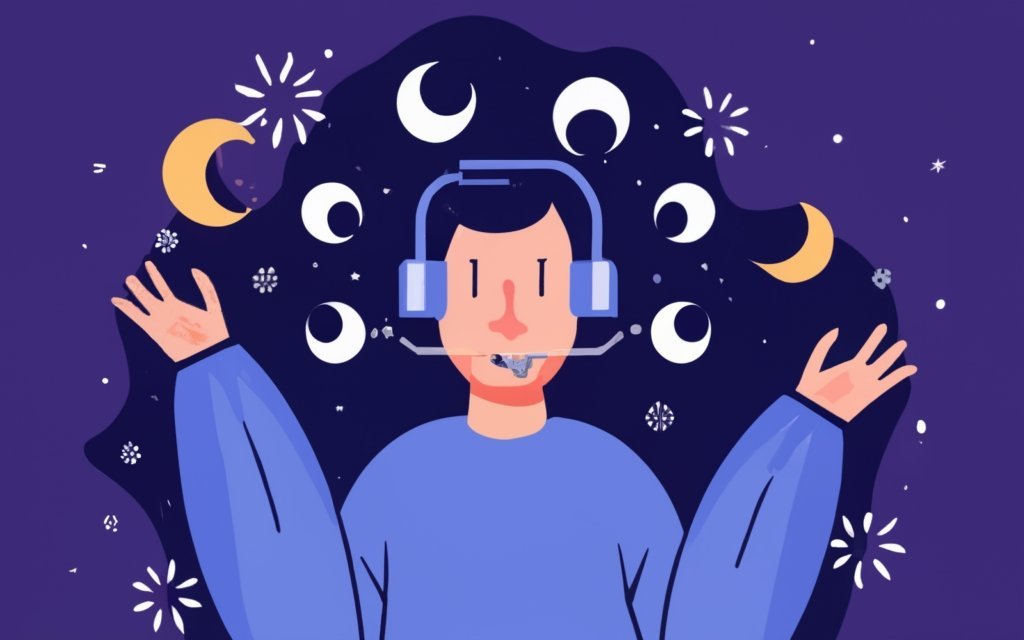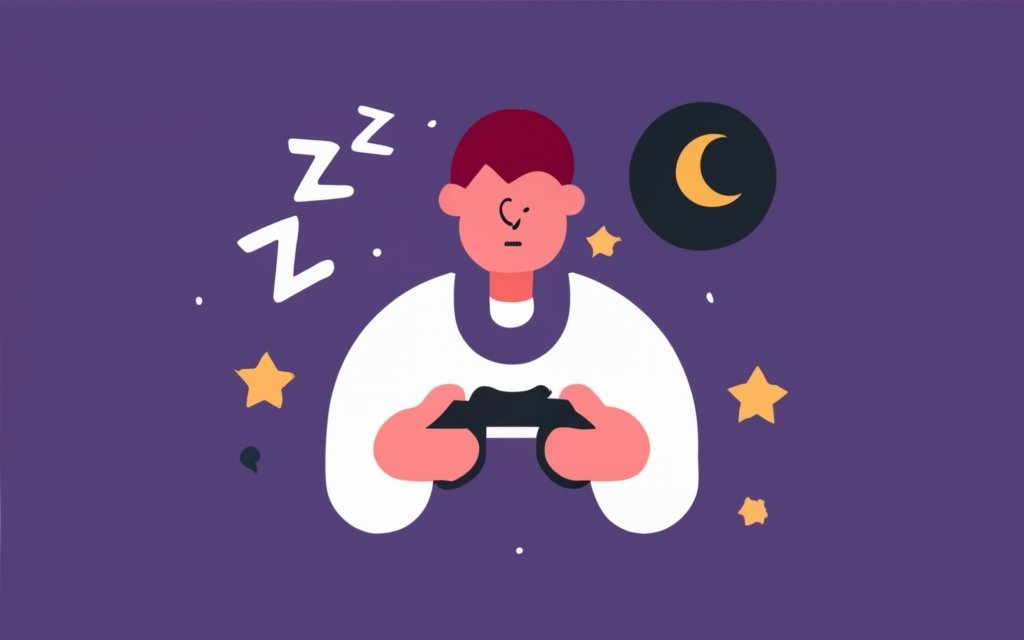Yes, video games can cause insomnia. Studies have found that video games are linked to later bedtimes, more difficulty falling asleep, and fewer hours of sleep. Players may also find it more challenging to wake up on time and are at an increased risk of feeling tired the following day1. Exposure to video games before bedtime has been associated with poor sleep quality and quantity2.
A systematic review of experimental evidence found that exposure to video games can negatively impact sleep patterns and post-sleep cognitive abilities2. The review also found that video game exposure can lead to shorter sleep duration, poorer sleep quality, and delayed sleep phase.
A recent study found that gamers will push off obtaining adequate sleep in order to continue video gaming, leading to missed sleep for a significant percentage of gamers. The study also found that excessive gamers are more likely to report sleeping later because of playing video games and to exhibit symptoms of depression, anxiety, and excessive daytime sleepiness.
Another study found that sleep efficiency decreased when participants played video games immediately before going to sleep instead of taking part in other non-stimulant activity5.In conclusion, video games can cause insomnia and negatively impact sleep quality and quantity.
The evidence suggests that exposure to video games before bedtime can lead to delayed bedtimes, shorter sleep duration, and poorer sleep quality.
Excessive gaming behavior can also lead to missed sleep and symptoms of depression, anxiety, and excessive daytime sleepiness. It is important to be aware of the potential negative effects of video games on sleep and to take steps to reduce exposure before bedtime.
Brief Overview of the Popularity of Video Games and Their Potential Impact on Sleep.
Video games have become an integral part of modern culture, with millions of people worldwide spending countless hours playing them. These games range from simple puzzle games to complex multiplayer experiences, providing entertainment and a sense of accomplishment for players of all ages.
However, the increasing popularity of video games and the amount of time spent playing them has raised concerns about their potential impact on sleep and overall well-being.
Research has shown that excessive screen time can lead to sleep disturbances and insomnia. The stimulating effects of video games, combined with the immersive nature of gaming, can make it difficult for players to wind down and prepare for sleep. This can result in disrupted sleep patterns and decreased sleep quality, which can have long-term effects on physical and mental health.
Mention the Increasing Concern About the Effects of Video Game Exposure on Sleep and Well-being.
The growing body of research on the impact of video games on sleep and well-being has led to increased concern among health professionals and the general public. Studies have found that prolonged video gaming can lead to sleep disturbances and insomnia, with some players reporting symptoms such as difficulty falling asleep, waking up too early, and poor sleep quality.
Moreover, the impact of video games on sleep is not just about the quantity of time spent gaming, but also about the nature of the games. Some games are designed to keep players engaged for long periods, with fast-paced action and minimal breaks. This can lead to a state of chronic arousal, making it difficult for players to relax and fall asleep.

Furthermore, the social aspect of gaming can also contribute to sleep problems. Many video games are played in multiplayer mode, which can lead to late-night gaming sessions and disrupted sleep patterns. Additionally, the competitive nature of gaming can create stress and anxiety, which can also interfere with sleep.
In conclusion, while video games can be a source of fun and relaxation, it’s important to be mindful of the potential impact on sleep and well-being. If you’re experiencing sleep problems after gaming, it might be worth exploring strategies to manage your gaming habits and ensure you’re getting enough rest.
Effects of Video Games on Sleep.
Video games, while a popular form of entertainment, can have a negative influence on sleep quality and quantity. Research has shown that excessive gaming can lead to disruptions in sleep patterns, causing delayed bedtimes and shorter sleep durations.
This is primarily due to the stimulating effects of video games, which can keep players engaged for extended periods, making it difficult for them to wind down and prepare for sleep.
Studies have found that exposure to video games before bedtime can lead to poor sleep quality. This is because the stimulating effects of video games can interfere with the body’s natural sleep-wake cycle, making it harder for players to fall asleep and stay asleep.
Furthermore, the immersive nature of gaming can make it difficult for players to switch off from the game, which can lead to decreased sleep efficiency.
Moreover, playing video games before bedtime can lead to decreased sleep efficiency. This is because the stimulating effects of video games can interfere with the body’s natural sleep-wake cycle, making it harder for players to fall asleep and stay asleep.
Additionally, the immersive nature of gaming can make it difficult for players to switch off from the game, which can lead to decreased sleep efficiency.
The impact of excessive gaming on sleep patterns is not just about the quantity of time spent gaming, but also about the nature of the games. Some games are designed to keep players engaged for long periods, with fast-paced action and minimal breaks. This can lead to a state of chronic arousal, making it difficult for players to relax and fall asleep.
In conclusion, while video games can be a source of fun and relaxation, it’s important to be mindful of the potential impact on sleep and well-being. If you’re experiencing sleep problems after gaming, it might be worth exploring strategies to manage your gaming habits and ensure you’re getting enough rest.
Post-Sleep Cognitive Abilities.
The impact of video game exposure on post-sleep cognitive abilities is a topic of increasing interest in the field of neuroscience and psychology. Studies have found that exposure to video games can have negative outcomes in various areas, including behavioral, emotive, cognitive, and physical health spheres, all of which are linked to sleep quality and quantity.

Research has shown that playing video games, particularly violent ones, can negatively influence alertness and cognitive abilities. This is particularly true for individuals who are low-exposed to video games.
The stimulating effects of video games can interfere with the body’s natural sleep-wake cycle, making it harder for players to fall asleep and stay asleep. Furthermore, the immersive nature of gaming can make it difficult for players to switch off from the game, which can lead to decreased sleep efficiency.
Moreover, the impact of excessive gaming on sleep patterns is not just about the quantity of time spent gaming, but also about the nature of the games. Some games are designed to keep players engaged for long periods, with fast-paced action and minimal breaks. This can lead to a state of chronic arousal, making it difficult for players to relax and fall asleep.
In conclusion, while video games can be a source of fun and relaxation, it’s important to be mindful of the potential impact on sleep and well-being. If you’re experiencing sleep problems after gaming, it might be worth exploring strategies to manage your gaming habits and ensure you’re getting enough rest.
Problematic Gaming and Sleep.
Problematic gaming behavior can significantly impact sleep patterns, leading to shorter sleep duration, poorer sleep quality, and delayed sleep phase. A systematic review and meta-analysis have found that problematic gaming behavior is associated with sleep impairments, indicating that problematic gaming is related to adverse outcomes.
However, the field is currently in urgent need of more high-quality studies and longitudinal investigations to understand the directionality and causality between problematic gaming and sleep problems 2.
The relationship between problematic gaming behavior and sleep problems is complex and multifaceted. Excessive gaming can lead to a state of chronic arousal, making it difficult for players to relax and fall asleep. This can result in disrupted sleep patterns and decreased sleep quality, which can have long-term effects on physical and mental health.
Moreover, problematic gaming behavior can also contribute to sleep problems in other ways. For example, the competitive nature of gaming can create stress and anxiety, which can interfere with sleep. Additionally, the social aspect of gaming can also contribute to sleep problems. Many video games are played in multiplayer mode, which can lead to late-night gaming sessions and disrupted sleep patterns.
In conclusion, while video games can be a source of fun and relaxation, it’s important to be mindful of the potential impact on sleep and well-being. If you’re experiencing sleep problems after gaming, it might be worth exploring strategies to manage your gaming habits and ensure you’re getting enough rest.
Latest Findings.
The latest research findings suggest that excessive gamers are more likely to report sleeping later due to playing video games and to exhibit symptoms of depression, anxiety, and excessive daytime sleepiness.
This is due to the high arousal that can interfere with body soothing processes necessary for sleep. Playing online games can also result in the release of stress hormones, especially when there is a difficult situation in the game that needs the gamers paying high attention and focus.
Furthermore, the artificial blue-spectrum light emitted by screens projecting the visual gaming content may also directly enhance alertness and arousal, suppressing nighttime melatonin secretion, important in regulating the sleep-wake cycle.
In addition, the latest research shows that gamers will push off obtaining adequate sleep in order to continue video gaming, leading to missed sleep for a significant percentage of gamers.

This is further supported by the fact that gaming more than an hour a day has been linked to a 30% higher risk of poor sleep quality. Longer stretches of gaming are linked to less total sleep time, more trouble falling asleep, and more daytime sleepiness.
While video games can be a source of fun and relaxation, it’s important to be mindful of the potential impact on sleep and well-being. If you’re experiencing sleep problems after gaming, it might be worth exploring strategies to manage your gaming habits and ensure you’re getting enough rest.
Effects of Video Games on Sleep Quality.
Video games can significantly impact sleep quality, leading to a reduction in Total Sleep Time (TST) and an increase in Sleep Onset Latency (SOL). These changes in sleep patterns can result in disrupted sleep architecture, with alterations in the REM sleep and Slow Wave Sleep (SWS).
Furthermore, excessive video gaming, particularly in the evening, can lead to insufficient and low-quality sleep, with potential effects on cognition in the subsequent waking days.
Problematic Gaming Behavior and Sleep.
Problematic gaming behavior can have a significant impact on sleep. Gamers with higher gaming addiction scores are more likely to have shorter, poorer quality sleep and greater daytime sleepiness and insomnia scores than gamers with lower gaming addiction scores and non-gamers.
High-volume gamers are more likely to have worsened sleep quantity and quality, with delayed sleep timing and increased prevalence of insomnia.
Long-Term Effects of Video Gaming on Sleep Patterns and Well-being.
The long-term effects of video gaming on sleep patterns and well-being are not yet fully understood. However, the existing literature suggests that excessive video gaming can displace healthier activities such as social, academic, or athletic efforts.
Furthermore, video gaming during nighttime can delay sleep onset, interfere with sleep duration and efficiency, and also affect sleep architecture. Despite the high potential to impact sleep and health, there are limited studies on adult gamers, who represent the majority demographic in esports.
Therefore, more research is needed to fully understand the long-term effects of video gaming on sleep patterns and well-being.
Conclusion.
In conclusion, the impact of video games on sleep and post-sleep cognitive abilities is significant. Excessive gaming can lead to sleep disturbances, including delayed sleep onset, reduced total sleep time, and increased sleep onset latency.
This can result in poorer sleep quality and increased sleepiness and self-perceived fatigue. Furthermore, exposure to video games, particularly violent ones, can negatively influence alertness and cognitive abilities.
However, the relationship between video gaming and sleep is complex and multifaceted. While some studies have found a negative relationship between video gaming and sleep, others have found no significant effect. This inconsistency may be due to differences in participants’ age, the type of video games used, and methodological differences in polysomnographic assessments.
Moreover, the impact of video gaming on sleep is not just about the quantity of time spent gaming, but also about the nature of the games. Some games are designed to keep players engaged for long periods, with fast-paced action and minimal breaks. This can lead to a state of chronic arousal, making it difficult for players to relax and fall asleep.
The field is currently in urgent need of more high-quality studies and longitudinal investigations to understand the directionality and causality between video gaming and sleep problems.
This will help to provide a more comprehensive understanding of the impact of video games on sleep and post-sleep cognitive abilities, and to develop effective strategies to manage this impact. Consider reading another article i wrote about >>>> Can video games damage your eyesight? to learn more.






